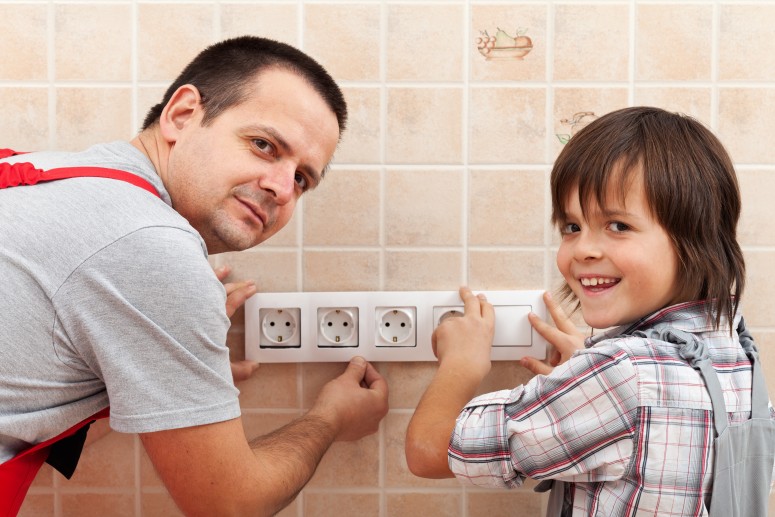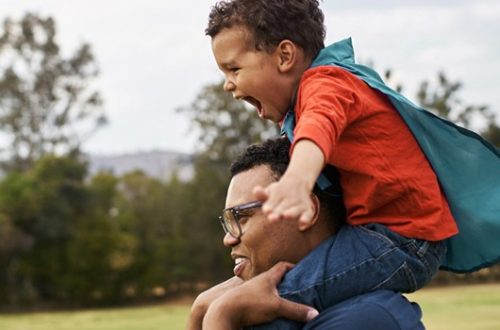Conserving energy in the face of global warming and the exhaustion of limited fossil fuel resources is vital for the future well being of everyone on the planet. Renewable energy has thus come to the forefront of political and indeed personal thinking, at local, regional, national and international levels. Governments, scientists and businesses are engaged in promoting green energy solutions, and many individuals at home and at work are proactive in their efforts to conserve energy and use it more efficiently.
So, where are children in this equation? They are certainly consumers of energy but how much do they know about the importance of energy efficiency and how do parents encourage them to be mindful about sustainability and energy conservation? Here are a few useful tips for dads who want to pass on their own knowledge and teach their kids about energy efficiency.
Communication not commands
In the days when grandpa yelled at the kids to shut the door or turn out the light when leaving a room, it was easy to dismiss such instructions as slightly eccentric banter. Nowadays, however, the commonsense reasons for shutting the door (to conserve heat and avoid droughts) or turning out the light when leaving a room (to save electricity) are proving to be part and parcel of what everyone can do to help the environment.
So, rather than simply issuing instructions to close doors, turn out lights or unplug electrical devices, it makes far more sense to have a parent-child dialogue about why it’s important to save energy, as well as which resources are precious and what could happen if one day they were to be in short supply. No mother or father wants to be a scaremonger, and although the future of the planet’s resources is a serious topic, there are a number of approaches that can make it easier to get the message across to children without causing undue concern.
Contemporary living
Technology has resulted in the rapid growth of in-home display (IHD) devices, and children, as well as adults, have easy access to smartphones, tablets, laptops and personal computers, in addition to audio devices such as iPods and MP3 players. Energy usage is therefore pertinent to all.
In school, children learn about the history of various types of energy – the discovery of electricity, for example, and how the physical strength and force of water was harnessed to provide hydro-electric power, as well as the many different kinds of fuel that have been used to keep people warm, including coal, wood, oil and gas. As the world moves into an age when traditional sources are challenged by new technologies, wind farms, solar energy and hydro power have moved up the agenda in the quest for renewable sources of energy.
This is a great opportunity for dads to explore the exciting technology that has emerged in response to the very real threat posed by climate change, and thus to teach their children about how energy conservation works and the benefits it brings.
New horizons
The first step is to make sure that children know about the different kinds of traditional sources of energy and the fact that these are finite – one day they will run out.
The next step is to introduce the potential benefits of the new types of renewable energy that scientists, economic researchers and energy experts such as Daniel Yergin are exploring today. Yergin’s bestselling book, The Quest: Energy, Security, and the Remaking of the Modern World, is internationally renowned – describing his concept of energy security is a great way of explaining to young people how the global economy, global policies and global planning have been affected by the requirement to secure energy resources – that is, to find them and to retain them, principally for the benefit of the developed nations in the western world.
Finally, children need to understand that small things can make a big difference if everyone plays their part. So while Mom and Dad may opt to turn down the thermostat or buy energy efficient appliances, be sure to show them the simple steps they can take:
• Turn off lights, TVs and radios when they are leaving a room.
• Have quicker showers.
• Make sure windows and doors are shut when the air-conditioning or heating is on.
• Older kids should always make sure there is a full load in the dishwasher and in the washer or dryer.
Add to this the healthful benefits of walking or cycling and the environmental benefits of using public transportation, and the kids will well and truly get the energy efficiency message.






